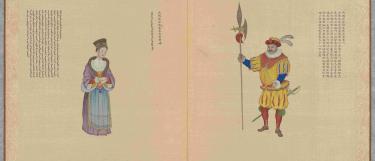
Intellectual History
Intellectual historians have moved beyond a narrow focus on disembodied ideas and their heroic proponents, or “what famous men said and did.” Instead, we probe general questions about the production and circulation of knowledge by reconstructing the meanings generated in social interactions in their historical, cultural, political, and material contexts.
The department of Intellectual History is designed to add a transcultural dimension to an intellectual history so conceived, with a special emphasis on contributions from East Asia. Highlighting transcultural aspects in the history of knowledge goes beyond tracing the influence of ideas claimed by one culture in another. Rather, our team examines how concepts, arguments, theories, and the practices through which ideas become tangible are continuously reconfigured in situated co-productions. To recreate these interactions, we analyze processes of translation, adaptation, and transformation at multiple levels, from the local to the global. Our aim is to contribute to a more credibly global intellectual history that reflects the dynamics of knowledge production in a transcultural world.
Research
Our team studies the histories of science and thought between and within East Asia and Europe from the early modern period to the present. We explore, for instance, practices of argumentation and cultures of reasoning; issues of translation and conceptual adaptation; the relations between texts and images; as well as the role of specific spaces and places in circulations of ideas and skills. Thematic foci range from the histories of philosophy, logic, cartography, and technology to political theory, fundamentalism, and the ambivalences of enmity. We collaborate with partners in Asia, Europe, and North America, and engage with disciplines ranging from history, philosophy, literary and area studies to political science and psychology.
Studies
Teaching in intellectual history serves students in Transcultural Studies, Chinese and East Asian Studies as well as global history and philosophy. We offer courses on large subjects such as changing notions of time and space, culturally inflected ways of representing the past, or different forms of cosmopolitanism. Other classes focus on narrower topics such as philosophical encounters between Asia and Europe, nationalism as a global concept, Chinese conceptions of charity, welfare, and justice, or the works of East Asian thinkers commonly ignored in global histories of knowledge. In all our teaching, we combine close readings of primary materials, whenever possible in original languages, with reconstructions of their relevant contexts and effects, and explorations of diverse methodological approaches and theoretical perspectives.



